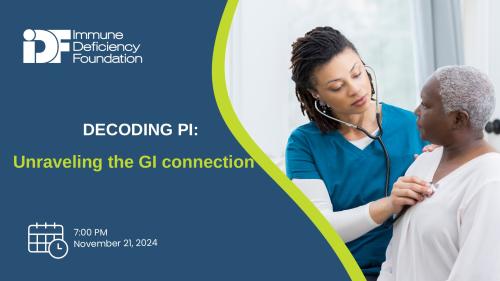
-
Understanding primary immunodeficiency (PI)

Understanding PI
The more you understand about primary immunodeficiency (PI), the better you can live with the disease or support others in your life with PI. Learn more about PI, including the various diagnoses and treatment options.
-
Living with PI
-
Addressing mental health
-
Explaining your diagnosis
- General care
- Get support
- For parents and guardians
-
Managing workplace issues
- Navigating insurance
-
Traveling safely

Living with PI
Living with primary immunodeficiency (PI) can be challenging, but you’re not alone—many people with PI lead full and active lives. With the right support and resources, you can, too.
-
Addressing mental health
-
Get involved

Get involved
Be a hero for those with PI. Change lives by promoting primary immunodeficiency (PI) awareness and taking action in your community through advocacy, donating, volunteering, or fundraising.
-
Advancing research and clinical care
-
Grants
-
IDF surveys
-
Participating in clinical trials
-
Diagnosing PI
-
Consulting immunologist
-
Clinician education

Advancing research and clinical care
Whether you’re a clinician, researcher, or an individual with primary immunodeficiency (PI), IDF has resources to help you advance the field. Get details on surveys, grants, and clinical trials.
-
Grants
With the increasing shortage of medical doctors in the United States, making an appointment with a physician can take weeks and even months. If your health matter is urgent, that timeline isn’t practical. Enter an alternative—nurse practitioners (NPs) and physician assistants (PAs). Both types of advanced healthcare practitioners often work alongside doctors and support the physicians with their patient load.
But is it OK to see these types of providers instead of a doctor? What kind of training do they receive? And are they qualified to meet your health needs?
In today’s healthcare climate, PAs and NPs can be acceptable options if a medical doctor is not available in a timely manner, even if you have a primary immunodeficiency (PI).
“It is not necessarily the letters after the person’s name. It is more about the care you are receiving. You want someone who listens and can treat the condition or illness,” said Colleen Brock, a registered nurse and IDF manager of medical programs.
“If you are really sick and you need to be seen, and the doctor has no appointments for months, but the NP or PA can see you next week, then go with one of them. The worst-case scenario is that the NP or PA consults with the doctor about your condition.”
Both an NP and a PA can perform many of the same functions as a physician, such as conducting exams, running tests, diagnosing and treating illnesses, and prescribing medications. However, the two roles require different educational backgrounds, training, and certifications, vary in their approaches to medicine, and diverge when it comes to practicing solo versus under physician supervision.
An NP is an advanced practice registered nurse (APRN) who has completed a bachelor’s of nursing degree, an NP-focused master’s or doctoral degree, and has passed a national NP board certification exam. NPs typically specialize in certain areas, such as family and adult care, acute care, gerontology, oncology, pediatrics, and women’s health.
NPs can act as primary care providers who provide direct care to patients. In 27 states, laws allow them to practice independently from physician oversight. In these states, NPs may evaluate patients, diagnose acute and chronic conditions, order and interpret diagnostic tests, and initiate and manage treatments, including prescribing medications and controlled substances. In the remaining states, they may either work in collaboration with doctors or be supervised by doctors.
NPs follow a nursing framework, and in treating patients, they focus more on how the illness affects the patient’s quality of life, education about healthy lifestyle choices, preventative care, and how best to approach care within a person’s community, culture, or socioeconomic status.
A PA is an advanced practice provider with a master’s degree in physician assistant studies and has also passed board certification. Unlike an NP who specializes in certain patient populations, a PA is typically trained in general medicine.
PAs work in primary care settings interdependently with physicians, and duties may include taking a health history, ordering and interpreting lab and diagnostic tests, prescribing medicine, performing physical exams, and assisting in surgery.
In addition to being available for primary care, PAs and NPs also work in specialist offices. Some patients may see a specialist, such as an immunologist, on their first appointment and then, on follow-ups, see an NP or PA in the practice. If an interaction with an NP or a PA leaves you with more questions, you can always advocate for physician consultation.
“You have the right to say, can you run this past the doctor? Is there any way they can look at notes and double-check and make sure they don't have a second opinion?” explained Brock.
While it’s helpful to have a provider who is familiar with PI, it’s not entirely necessary if they express interest in researching more about the condition.
“What you need more than anything is a provider who is willing to learn and willing to work with immunologists and other specialists,” said Brock.
Topics
This page contains general medical and/or legal information that cannot be applied safely to any individual case. Medical and/or legal knowledge and practice can change rapidly. Therefore, this page should not be used as a substitute for professional medical and/or legal advice. Additionally, links to other resources and websites are shared for informational purposes only and should not be considered an endorsement by the Immune Deficiency Foundation.
Related resources

IDF Patient & Family Handbook for Primary Immunodeficiency Diseases, Sixth Edition (Korean)

Manual para pacientes y familias sobre inmunodeficiencias primarias, sexta edición

Decoding PI: Unraveling the GI connection
Sign up for updates from IDF
Receive news and helpful resources to your cell phone or inbox. You can change or cancel your subscription at any time.





The Immune Deficiency Foundation improves the diagnosis, treatment, and quality of life for every person affected by primary immunodeficiency.
We foster a community that is connected, engaged, and empowered through advocacy, education, and research.
Combined Charity Campaign | CFC# 66309

